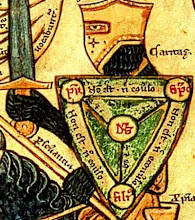It
is one thing to quote references to support one’s beliefs. It’s another thing to
fit it according to one’s bias.
I already pointed one example where the Iglesia ni Cristo (INC) made what is
hypothetical appear to be historical just to prove their assertion that the teaching on the deity of our Lord Jesus Christ “was formulated not because of biblical merits but because
of the whims of the emperor”[1]. (See “Setting the Record Straight Part 3”)
I also pointed out that even the word that the INC used (“formulate”) simply means, “to put
into a systematized statement or expression.” (See “Setting the Record Straight Part 2”)
Sadly,
it appears to be their tendency to twist reference books to fit their bias. In
another article, the INC made this allegation:
Sino lamang ang lumikha
ng aral na si Cristo ay Diyos? [Who alone devised
the teaching that Christ is God?] “Thus for example, it was not until 325 A.D.,
at the Council of Nicaea, that the Church defined
for us that it was an article of faith that Jesus is truly God.” [Quoting from
“Discourses on the Apostles’ Creed.”] ... Ang lumikha at nagturo ng aral na si
Cristo ay Diyos ay ang Iglesia Katolika. [The Catholic Church devised and taught
the doctrine that Christ is God.][2]
Note
how they made it appear that the deity of Christ is a man-made doctrine. They
claimed that the Catholic Church devised (“lumikha”) the said teaching. (They
used a Filipino word that also means “invented” or, literally, “created.”) But, look at the word the
reference that they quoted used: “the Church defined for us…” There is a big difference between “devise” and
“define.”
According to the Merriam-Webster dictionary, the word “devise” means
“to form in the mind by new combinations or applications of ideas or principles”.[3] But “define” has another meaning. It means, “to determine or identify the
essential qualities or meaning of”.[4]
To devise is to come up with something new. To
define is to clarify that which is already there. Despite what their quote clearly said, the INC made it appear
to support something contrary to what it actually said. As I already wrote, the
major church councils only defined and defended the doctrines about Christ, not
devise it. (See “Setting the Record Straight Part 2”)
Understandably, the INC may protest this because, as I have said, they used a word that literally means “create.” So, we may instead translate the above Pasugo quote this way: “Who created the doctrine that Christ is God? ... The Catholic Church created and taught the doctrine that Christ is God.” (Emphasis added) But, still, creating is different from defining. The word “create” means “to make or bring into existence something new”.[5] Plus, when the INC translated their quote from the “Discourses on the Apostles’ Creed,” they used a Filipino word for “define” that means “explain” (“paliwanag”).[6] Still, creating is different from explaining.
This
misuse of authorities seems to be not an isolated case. The website Examine the Iglesia ni Cristo exposed
how the INC deliberately misquoted a Bible scholar.
To
paraphrase Ryrie, I don’t know what English dictionary the INC used to
substantiate the idea that to define means to devise or to explain means to create but my Merriam-Webster gives no
such meaning. Such shows their lack of integrity or lack of scholarship in the misuse
of words.
(To be continued)
© 2012 Bible Exposé Apologetics Ministry. To know more about us, click here.
________________________________
[1] Ruben D. Aromin, “Just when was Christ made God?” Pasugo: God’s Message, July 1994, 16.
[2] Daniel D. Catañgay, “Ang mga katangian ni Cristo at ang Kaniyang likas na kalagayan,” Pasugo: God's Message, February 1995, 14. Emphasis added.
[3] Devise. 2012. In Merriam-Webster.com. Retrieved August 29, 2012, from http://www.merriam-webster.com/dictionary/devise.
[4] Define. 2012. In Merriam-Webster.com. Retrieved August 29, 2012, from http://www.merriam-webster.com/dictionary/define.
[5] Create. 2012. In Merriam-Webster.com. Retrieved August 29, 2012, from http://www.merriam-webster.com/dictionary/create.
[6] “Kaya, halimbawa, noon lamang 325 taon ng Panginoon, sa Konsilyo ng Nicea, nang ipaliwanag ng Iglesia sa atin na isang alituntunin ng pananampalataya na si Jesus ay tunay na Diyos.” Catañgay, 14. Emphasis added.
[7] “Honesty: Ryrie's Misquote,” Examine the Iglesia ni Cristo, 2000, http://examineiglesianicristo.com/honesty3.html (accessed August 29, 2012).
[8] Ibid.
[9] Ibid.




<< Home